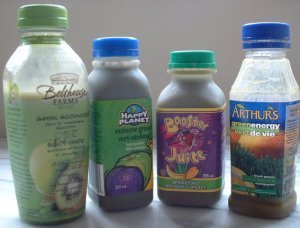 There’s nothing like a tasty glass of pond slime to get you started in the morning.
There’s nothing like a tasty glass of pond slime to get you started in the morning.
You’ve probably seem them in the supermarket, those bottles of icky green stuff, slotted in with the fancy juices and smoothies. With names like Green Goodness, Extreme Green and Green Energy, they are marketed in such a way as to make you feel super-healthy and pious after drinking one. But are they really the wonder food they’re made out to be?
First, it’s important to note that in all of the products I tested, the primary ingredients are various types of juice; apple, banana and mango top the lists, although some include pear, kiwi, pineapple, and even green tea. But the ingredient that we’re concentrating on is the one that gives each product its distinctive sludgy green colour – spirulina.
Spirulina is a type of blue-green algae, of which there are approximately 1500 species. It is named for its coil-like shape. According to Wikipedia:
Spirulina is a low fat, low calorie, cholesterol-free source of protein containing all the essential amino acids. It helps combat problems like diabetes, anemia and atmospheric pollution. It also helps combat ‘free radicals’ which can lead to ailments like cancer, arthritis, cataracts. Moreover, the gamma-linolenic acid (GLA) present in spirulina dissolves fat deposits, helps prevent heart problems and reduces “bad cholesterol”. The National Cancer Institute, USA, has additionally announced that sulfolipids in spirulina are remarkably active against HIV. Regular intake of spirulina increases anti-viral activity, stimulates the immune system, reduces kidney toxicity, improves wound healing and reduces radiation sickness.
However there is little scientific evidence of the nutritional value of spirulina and blue-green algae and there are many respected sources, such as The Berkeley Wellness Letter who believe there are none. Moreover it has been suggested that such supplements can be easily contaminated with microcystins and heavy metals (see above link). A court in California deemed thirty health claims made by one supplement producer to be false. From the ruling: “[The] defendant’s advertising as to the need for and benefits from defendant’s product imply that there is some reliable scientific basis for the claims such as would be reasonably expected by potential users. There is not.” (more details of court ruling). At this point all claims regarding the health and nutritional benefits of spirulina and blue-green algae should be viewed with skepticism.